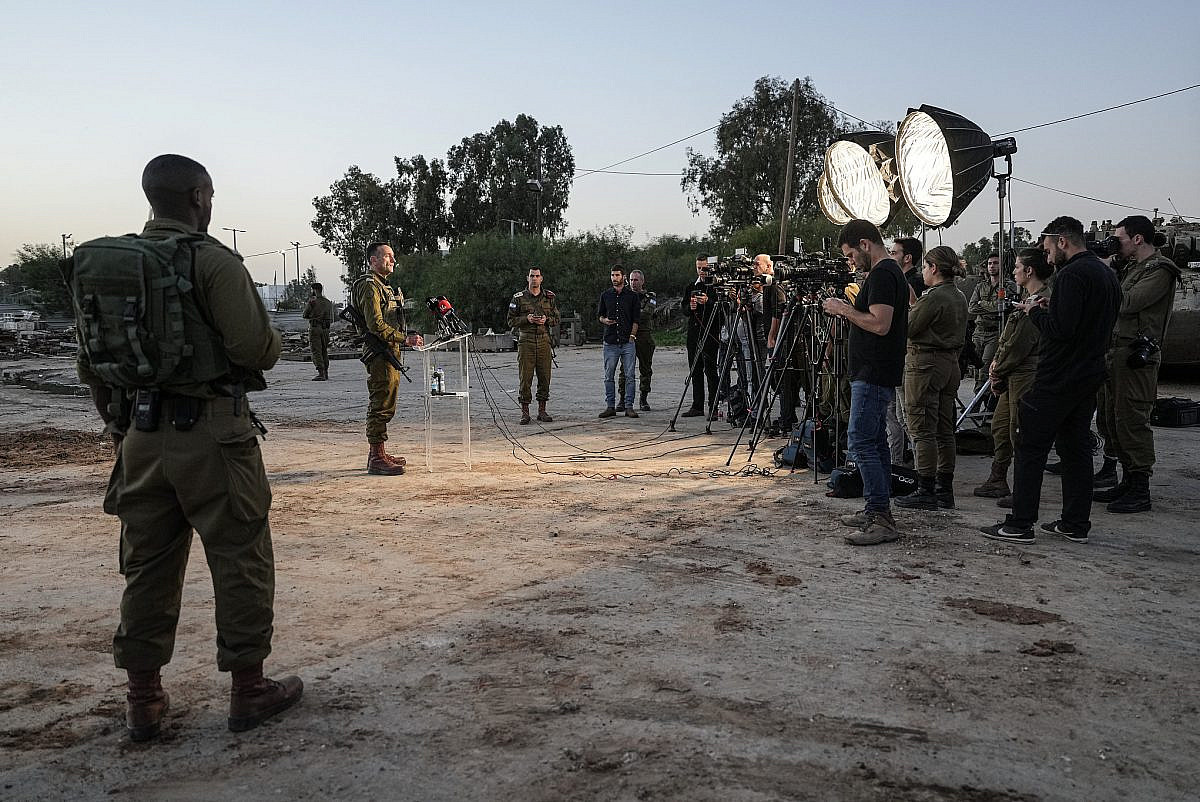Throughout the war, the majority of the Israeli media has been a parody of journalism. The average Israeli will have read countless articles about Gazans’ anger toward Hamas, but few, if any, about the fact Israel’s bombardment and intensified siege have killed more than 12,000 children, made large parts of the Strip uninhabitable, displaced millions, and created conditions of famine. And you can forget about any solidarity from Israeli journalists or media organizations with the more than 120 Palestinian journalists slaughtered over the course of Israel’s assault.
Perhaps we shouldn’t blame the media. Akiva Novick, a prominent news anchor and correspondent for Israel’s public broadcaster, Kan, believes that the role of journalists is to raise the national morale. After all, what the Israeli public wants to hear is that there are no innocent people in Gaza; Israel’s mighty army is winning; the whole world is antisemitic; and, contrary to all evidence, only military pressure will bring about the release of the hostages. And if Israeli soldiers shoot dead three hostages waving white flags — well, that too was Hamas’ fault.
The media’s abdication of responsibility didn’t begin on October 7. For years, Israelis have known little about what their army is really doing: stationing more and more soldiers in the West Bank to keep up with the ever growing settler population and sustain an apartheid regime. And while the biggest price for this is clearly paid by the Palestinians who live under the boot of the Israeli army, Israelis pay a price too.
Indeed, just two days before Hamas launched its assault on southern Israel, two commando units were moved from the Gaza fence to the West Bank in anticipation of their need to protect — or even aid — what many expected would be a settler rampage on the Jewish holiday of Simchat Torah. The remaining forces near Gaza were left totally unprepared for the attacks that followed.
Military correspondents at Israel’s mainstream news outlets not only fail to report on such issues; their constant exaltation of the army and willingness to take the IDF Spokesperson’s pronouncements at face value erroneously convince the public that all is swell. One barely needs to scratch the surface to understand how the media’s failure to scrutinize the army played a key role in leading Israel to the disaster of October 7.
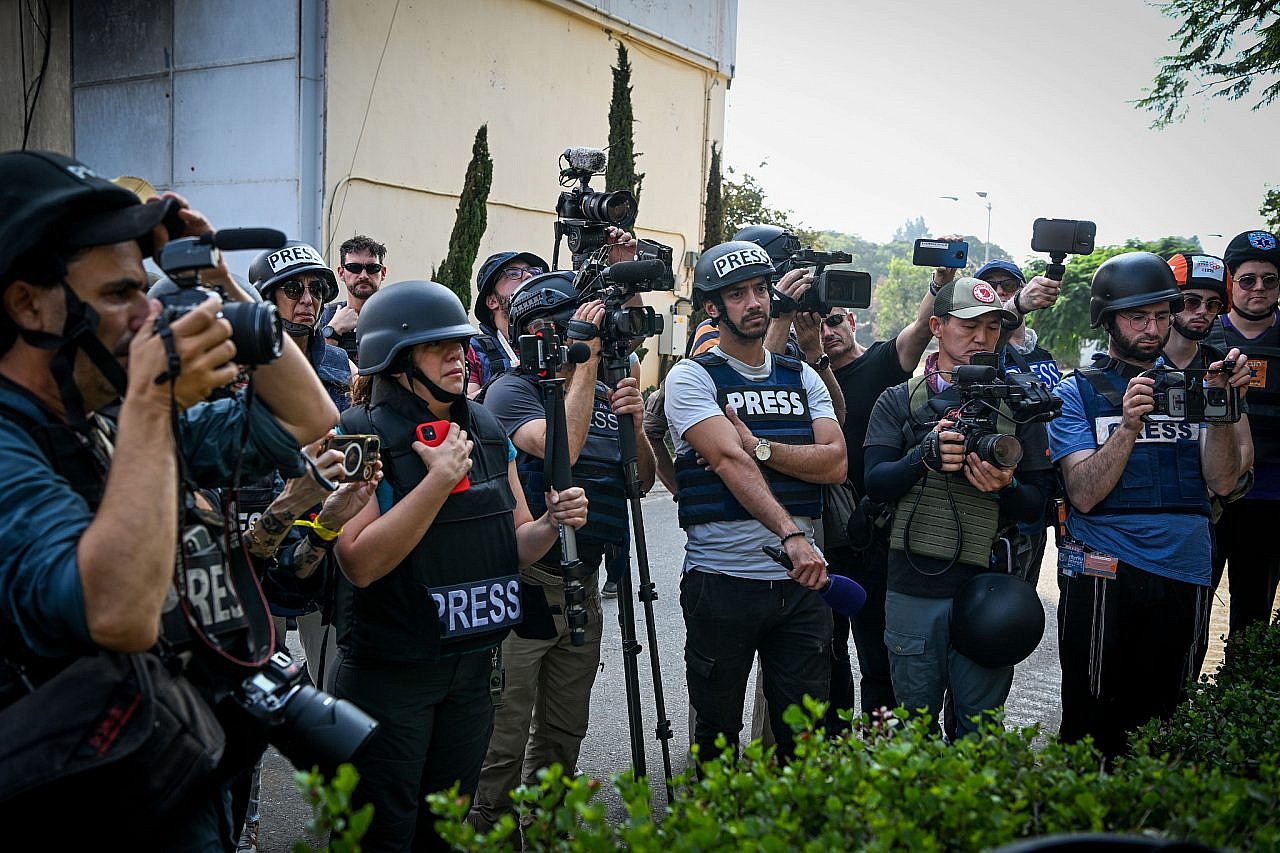
Consistently uncritical
Take the coverage of Amir Bohbot, the military correspondent for the right-leaning news site Walla. Just two months before the war, he wrote a short poem gushing about head of military intelligence Aharon Haliva and his supposedly impregnable plans. Diving into Bohbot’s portfolio, we find dozens more articles over the past two years written in a similarly glowing vein — and not a single critical or investigative report about the army and its activities. His criticism was doled out solely against the reservists who, as part of last year’s protests against the government’s judicial overhaul, threatened to not report for duty.
Alongside Bohbot we find Yossi Yehoshua from the somewhat more centrist Yedioth Ahronoth, who regularly praises the army and even denied that any military units were moved from the Gaza fence before October 7 (he later claimed it was only reservists). Before the war, his rigorous journalistic coverage included a news piece about Haliva’s “dive … into Tel Aviv’s tumultuous nightlife business.”
There’s also Hanan Greenwood from the right-wing daily Israel Hayom, who wrote an article about a “significant leap in our intelligence capabilities” in the aftermath of the army’s previous “victory” in Gaza, in 2021. Added to these are Channel 12’s Nir Dvori and Yonit Levi, who last year conducted a velvet glove interview with outgoing IDF Chief of Staff Aviv Kochavi, letting him get away with boasting about two years of relative quiet from Hamas.
Even a more critical newspaper like Haaretz fits many of these patterns. Its critiques of the army tend to focus on particularly heinous crimes by soldiers in Gaza and the West Bank, and this coverage is usually reserved for its opinion pages (in which I frequently publish) and written by non-military reporters like Gideon Levy and Amira Hass. Haaretz’s primary military reporter, Amos Harel, almost never covers the army with a critical eye, and even occasionally justifies the use of its repressive methods — like the pre-emptive arrest of Palestinians by using social media posts to predict who will commit a crime — and portrays them as appropriate defense measures.
Besides, despite the attention it receives internationally, Haaretz is read daily by only 5 percent of the Israeli population, and its news and opinion pages lie behind a strict paywall (a rarity in Israel); by contrast, Yedioth Ahronoth and Israel Hayom are both free and each read by over a quarter of Israelis every day.
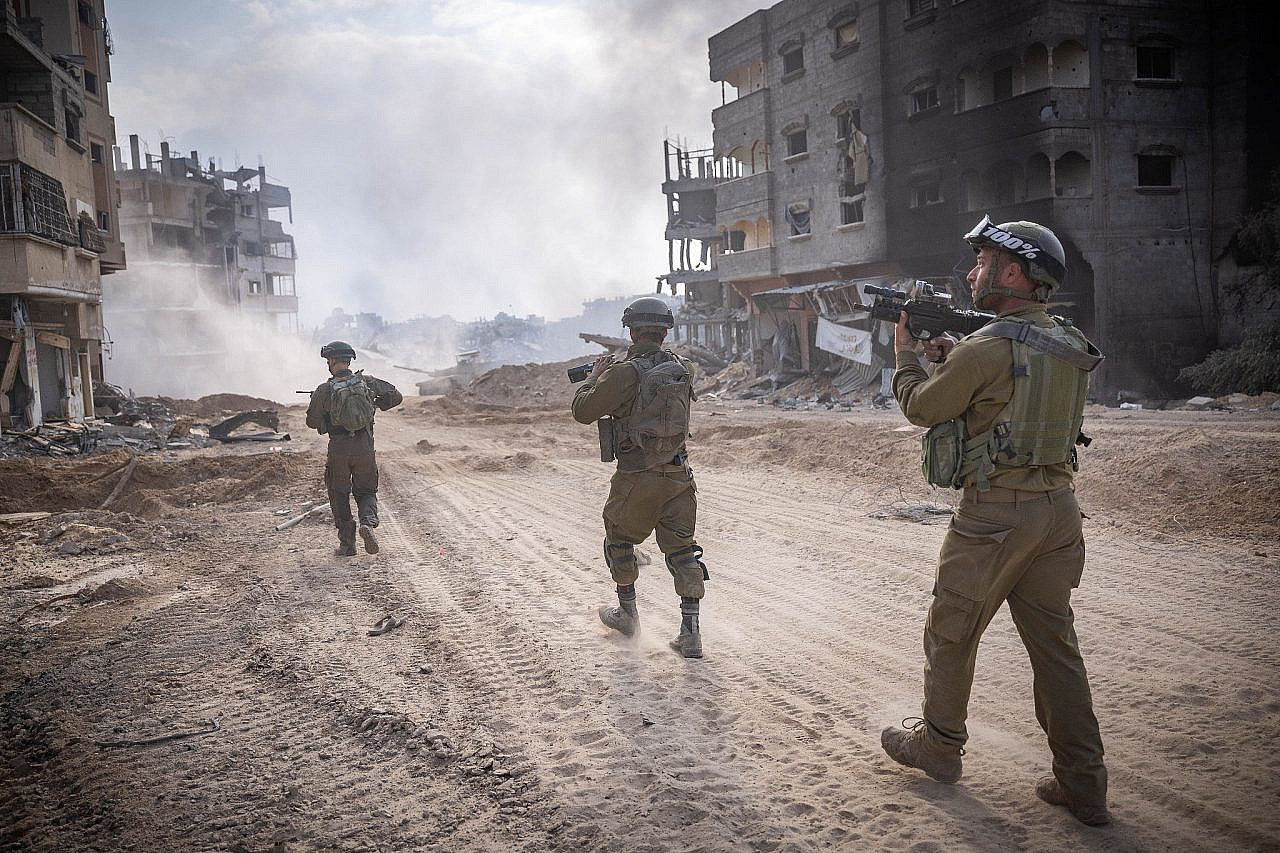
On the few occasions when Israeli news sites publish “investigative reports” by military correspondents, these tend to simply report on the military’s own internal investigations rather than conducting any independent investigations. An astonishing recent example was the army’s shooting of the hostages Yotam Haim, Samer Talalka, and Alon Shamriz: although this should have raised serious questions about the soldiers’ willingness to shoot people even after they have surrendered — and who knows how many times this has happened to Palestinians — the Israeli press simply reported the findings of the army’s own investigation.
It is, therefore, no surprise that the most significant investigative reports about the army’s conduct during the war have been published by foreign media outlets, not Israeli ones. For instance, it was the New York Times that revealed the alleged killing of Israelis by Israeli tank fire in Kibbutz Be’eri, under direct order of Lt. Colonel Barak Hiram — an allegation that had already been circulating in Israel but was not reported on. A few weeks earlier, when Hiram had been interviewed by leading Channel 12 journalist Ilana Dayan regarding his role in the fighting, Dayan entirely overlooked the Be’eri incident.
Even high-ranking Israeli military officers seem to be aware of the difference between local and foreign press. A month ago, a few such officers approached an American outlet, rather than an Israeli one, to share their concerns about the incompatibility of the goals of the ground operation in Gaza: dismantling Hamas and freeing all of the Israeli hostages. This crucial perspective — which undermines the oft-repeated goals of the ongoing slaughter — is totally ignored in the Israeli media, which largely concerns itself with propaganda and the official narrative that only force will free the hostages.
The price of obscuring the truth
About a decade ago, I published a series of investigative reports in +972 titled “License to Kill,” which explored cases investigated by the Military Police Criminal Investigation Division. These included murders of Palestinian teenagers who were shot in the back or the head by Israeli soldiers; forgeries and lies in investigations; and children bombed by unmanned aerial vehicles (back then, it was forbidden to report such incidents because of severe censorship).
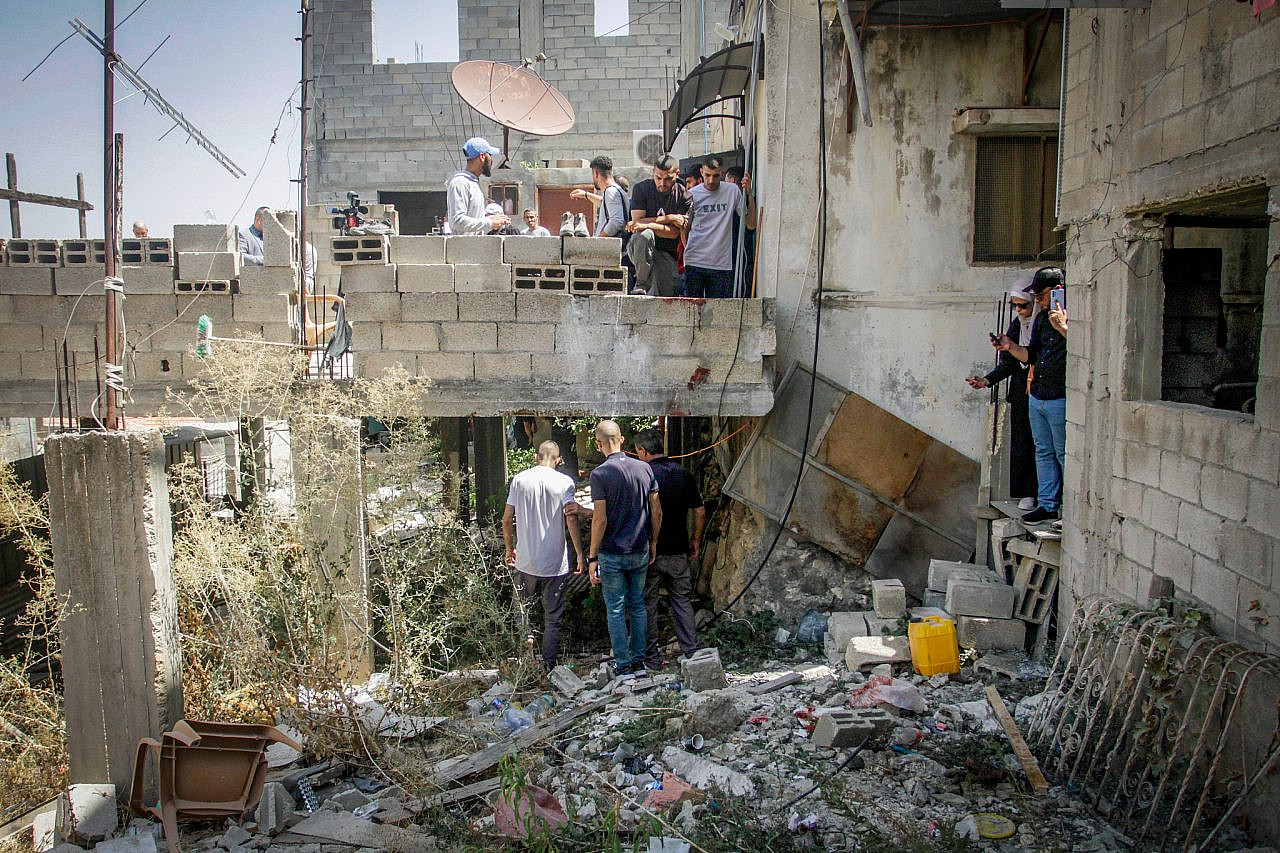
All the information was there, waiting to be published. Yet just as shocking as the revelations themselves was seeing that no Israeli military correspondent had bothered looking into these cases before.
A few years later, when I joined a group of reporters for a meeting with the IDF Spokesperson, I discovered that these reporters often just repeat what the Spokesperson tells them, sometimes removing the attribution to him and publishing the messages as news items. For example, when a soldier from the Netzah Yehuda battalion shot dead a mentally disabled Palestinian in the occupied West Bank town of Silwad, a prominent defense reporter, Alon Ben David, tweeted that a terrorist had fired toward soldiers and was subsequently killed. This was a lie: he did not fire at the soldiers, and he was shot in the back (Ben David later corrected himself).
The same thing happened when an Israeli officer stood on a bridge on Route 443 in the West Bank and killed a Palestinian teenager with a bullet to the head. Channel 13 reported that the teenager had thrown stones (the article has since been removed); again, this was a lie.
In almost every case I investigated, the IDF Spokesperson spread false information which was then parroted — without attribution and in an authorial voice — in the Israeli media. Sometimes these reporters even function as PR for the army, such as when they are invited to watch the military train with a new weapon that may need marketing before being exported to a dictatorship.
In fairness to many of my Israeli colleagues, if they were to investigate the army’s shootings of Palestinians in the West Bank or bombings in Gaza, they would likely be left jobless; the Israeli public simply doesn’t want to hear such news (I am able to write freely only because I have a day job as a university lecturer.) But we Israelis also pay a price for the failure of military correspondents to do their duty.
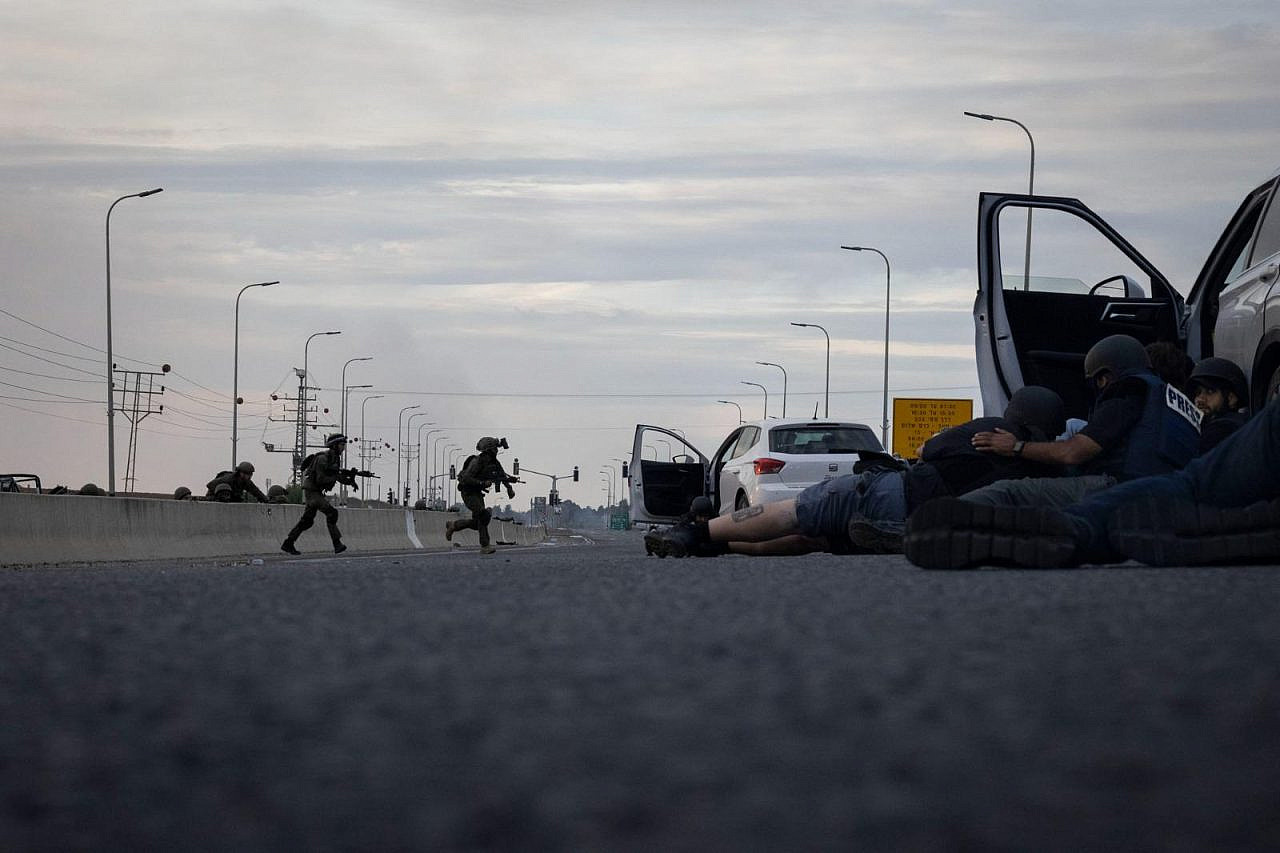
I myself, for example, as a resident of the south, had no way of knowing that the army had essentially abandoned me just before Hamas launched its October 7 attacks. I couldn’t have known that the army was so confident in its ability to predict an attack hours in advance that there was apparently no concern about leaving the border unprotected.
I couldn’t have known that there were, in fact, few forces in the entire region able to defend the communities in the scenario of a breach of the border fence; nor that a few Toyotas and motorcycles could overwhelm an entire Gaza division whose budget runs into the billions; nor that its entire command team sat in the same vulnerable spot in Re’im.
Journalists must fill this critical void in the public’s knowledge. We have no judicial system that effectively supervises the army, nor do we have a system for public oversight of its budget. Military officers are seemingly never held accountable for their criminal behavior, even when the wrongdoing is obvious.
Most read on +972
Though these crimes would make headlines in any other country, when I approach fellow journalists about the incidents I discover, no one wants to touch these stories. While the army is free to even conduct psy-ops against the Israeli public without repercussions, few if any press outlets are willing to challenge its official narrative.
Rigorous journalism is a requirement of any healthy society; only with the fullest understanding of reality can people demand a course correction from the authorities when they err. It is astonishing that a military state like Israel lacks critical military journalists. After the politicians and the army take responsibility for the failures of October 7, the Israeli media must also repent and account for its years of failure.
A version of this article was first published in Hebrew on Local Call. Read it here.

